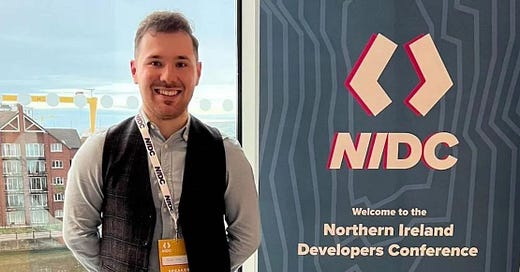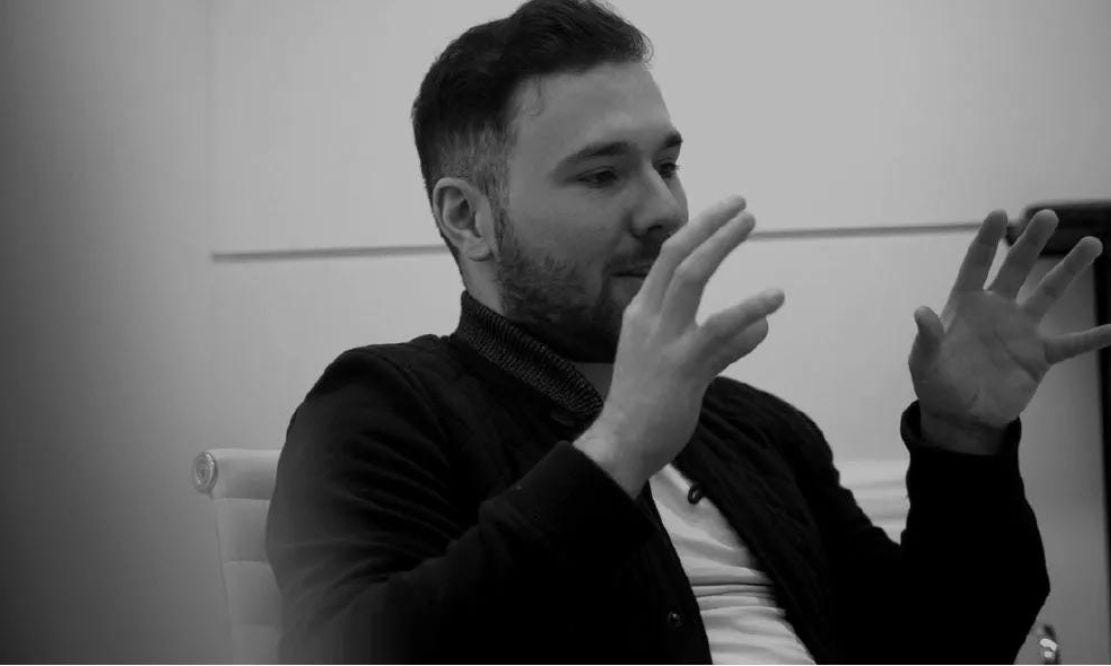This Co Armagh man is using artificial intelligence to revolutionise prosthetic devices
Jarlath Warner on how artificial intelligence can change the world for the better..
Hello and welcome to Entrepreneur NI – a weekly newsletter brought to you every Sunday morning, showcasing how founders created some of the best businesses in Northern Ireland – big, small and everything in between. This week we talk to Co Armagh man and up-and-coming entrepreneur, Jarlath Warner. If you haven’t already subscribed, you can do so here..
Sometimes it’s hard to get your head around some of the technology we see in front of us everyday. Concepts and ideas may seem alien to us but everyday there is an entrepreneur out there somewhere creating amazing products.
One of those amazing entrepreneurs is 24-year-old Jarlath Warner from Madden, Co Armagh. He has always had an interest in technology, and he always knew he wanted to help people, so he combined the two and created his company, Axonnr.
Computer science and, in particular, artificial intelligence (AI) may invoke a sense of dread (Terminator style dread) but the end product, in reality, has the potential to change the lives of so many people for the better.
In a nutshell, Axonnr uses AI technology to help develop real solutions for people living with mobility issues – in particular, amputees – generating ground-breaking ideas for the future of prosthetic developments.
Jarlath is a little different to the entrepreneurs we have interviewed to date, for his company is in its infancy but the potential is almost infinite. He was recently included in the Belfast Telegraph’s 30 under 30 of young entrepreneurs to look out for – and there’s a good reason for that.
Jarlath grew up attentive to the technological advancements around him – he was fascinated by them – and while it may be a little unfair to say serendipity played a part in Jarlath’s story, as he may have always found his way along this path, we’ll pinpoint a moment in his youth that certainly gave him a little nudge towards his destination.
At 16, he sent his CV into Computer World, a small computer shop based in Armagh City, not thinking he would get the gig but like many employers, when they see the right CV, they know. And Computer World clearly knew.
“I remember as soon as I sent in the CV to Computer World, the following week, I got the phone call to come in for an interview,” he said. “It was very fortunate because, even if I didn't get the job, I still would have had a love for computers, but getting that job was great, it's always good to be in the sort of environment you actually want to work in.
“Computer World was my first part time job. In there I learnt how to fix computers; then once I was able to do that, I thought, ‘now let’s build one’. After that, it’s a complete rabbit hole you go down where you’re always looking to find a new component to try and make the computer a little bit faster. As more components get released you’re always trying to upgrade.”
A few years later and university beckoned, where Jarlath met so many other like-minded people. Helping his peers build their own computers became part of the norm; it, Jarlath admits, was a completely new rabbit hole of exploration in itself.
Jarlath is currently studying a PhD in Computer Science at Queen’s University; naturally enough, he’s using a computer he built for himself. However, it was during his research into prosthetics as an undergraduate – during lockdown – that the idea for his company began to manifest itself.
“Before I actually started university, I was always looking to do medicine,” he explained. “My main sort of ambition, when I was younger, was to try and specialise in technology from a medicinal point of view. But when I did all those shadowing events – where we went down to Belfast to shadow a doctor – I got to see what that kind of career would be like and I realised I didn't want to go that way.
“In the end I sort of flipped it around and focused on computer science but with the intention of always trying to specialise in medicine somehow, which led me down this road to investigate and do research in this area.”
Jarlath’s aim is to use artificial intelligence to read an amputee’s signals from their stump and then translate these to movements on to their devices. That’s the aim of Axonnr, the company Jarlath has set up to help realise his ambitions and turn his theories into a reality.
Said Jarlath: “We're trying to tackle this issue from a technology perspective as opposed to a prosthetic company perspective. We're trying to use artificial intelligence to create new innovative medical devices, to create a technology that can understand the signals produced by our muscles, and our bio signals, just from electrical activity within our bodies.”
For Jarlath, it’s equally important that his technology is as accessible to as many people as possible.
“There are so many different problems that can be solved using technology and I really do believe the lives of people can be improved if this technology is applied in the right way.
“It shouldn’t just be the ultra rich who can access this technology but your everyday patient. I do believe it should be readily accessible and that's another big driving factor for the company and our ethos.”
It’s still early doors for Axonnr but Jarlath’s journey has already opened doors to amazing opportunities and fascinating start-ups who have helped contribute in various different ways to his goal.
Setting up business has been “an eye opener to say the least” and Jarlath credits Queen’s Student Union Enterprise which has helped guide students like him with their ideas to get them up and going – almost like a parent letting go of a child riding without stabilisers. Jarlath has gotten rid of the training wheels.
“I then progressed from the SU Enterprise department onto Invest NI, and then from the likes Invest NI to Innovate UK, so it’s these slow progressional steps, and it’s through those programmes where you start to fill the gaps with the business knowledge you need. Business was certainly not my forte but within the last year my business mindset has definitely grown.”
Jarlath’s network of cohorts, both within Queen’s and beyond, has also grown.
“You get familiar with people and the issues they have encountered and likewise, them with some issues I've encountered. You also start to focus in on the startups within your sort of area.
“But also to have non-startup, non-company networks, like my own friendship groups, who keep me in the loop with what's happening in the software industry. It’s really good to keep involved with all sorts of little networks.”
While learning the intricacies of business is an important aspect of growing, it’s down on the list of priorities for Jarlath whose research is front and centre of moving his company forward.
While it wasn’t an epiphany, the 24-year-old realised there was real merit in what he was researching and part of his research included looking into the technology currently available on the market and their capabilities.
Jarlath was unequivocal: “They're just not as advanced as what they could be.”
“With my own research I was like, ‘right there's something here’ because what I was capable of doing in my own room, on my own computer, in my opinion, it was out-performing the current devices. So it was at that point I knew there was definitely something here.
“And then one piece of research actually got published at an international conference for engineering, medicine and biology. Once I got published it reinforced my belief that there was merit to what I've done here and it was at that point I thought, ‘right, let's go for it’.”
The reaction from professionals who work with amputees and people suffering with Parkinson’s was “brilliant and it's definitely helped shape my mindset and where I want to take the technology”.
Jarlath admits that Axonnr will be a company where he will lead from the front. He wants to do things “the way I think they need to be done – I need to be in control myself”.
“There are some brilliant companies, and even just in Northern Ireland, doing some brilliant work but just far from my own sort of a vision, I knew setting up my own company was probably the best way to make it happen.”
It’s early days yet for the fledgling start-up but already it’s making waves having been shortlisted for the Digital DNA Start-up of the Year awards and now a finalist in the Invent 2023 Awards.
Jarlath has lofty ambitions for the company. In terms of global scale, the world is his oyster, especially with the potential around AI and how quickly that is developing.
He said: “Our technology, in its current form, is for prosthetic devices and, in particular, upper limb prosthetic devices but that's not all we're going to be doing. Down the line, we're hoping to expand into other forms of prosthetic devices like lower limb, as well as other sorts of mobility devices for people who have spinal cord injuries etc.
“Because our technology evolves around this ability to be able to read the signals in your body, the applications are endless... there's one sort of application, which hasn't been done before, and if we can pull it off, it will be mind blowing.
“Technology is constantly evolving; so what was probably thought of as impossible five years ago is now possible. So in five years time, something that's impossible now, is going to be possible. Just as long as we sort of adapt and evolve with it, I have high hopes for the company.”
The ideas behind some of the devices and applications currently being researched and trialled behind the scenes are out of this world. Jarlath and Axonnr, if his vision is to be realised, are on the precipice of a whole new world; one which will be better for so many people.
Job Profile
Just seven months into her new role with ASEE, Rostrevor’s Ceallach McSwiggan, has found a new lease of life in the company’s procurement department.
Previous Issues
The Business of Art: Why one Co Down teacher gave up a job to follow her dream
How three Newry brothers built a multi-million pound waste recycling business
How a Co Armagh designer found a niche and built market-leading brand on Etsy








